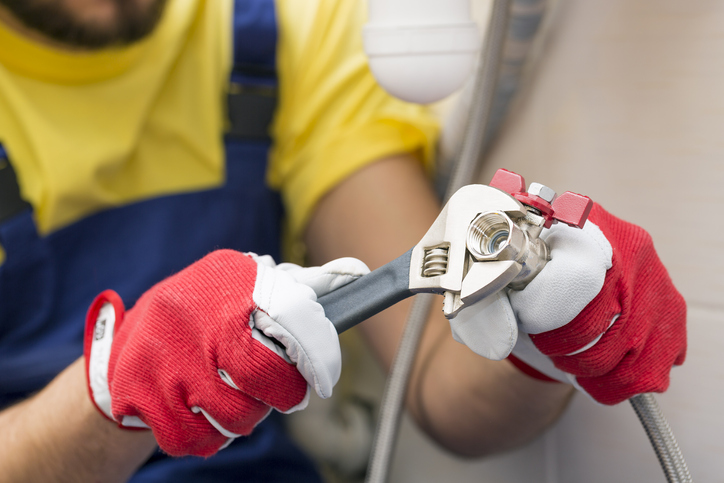What is Plumbers Insurance and Why Do You Need It?
If you work in plumbing, you’ll know there are various risks that can arise daily. From accidental property damage to on-the-job injuries, there are lots of things that can happen that are beyond your control.
Plumbers insurance helps protect your business from unexpected problems that could otherwise lead to significant financial losses. Let’s take a closer look at what plumbers insurance is and why it’s important for your business.
What is plumbers insurance?
Plumbers insurance is a tailored set of business insurance policies designed to protect you from the unique risks you face as a plumber. Whether you’re a sole trader or run a larger plumbing company, this insurance can cover incidents like:
- Accidental property damage
- Personal injury claims
- Theft of tools
By having the right cover in place, you can safeguard your business’ financial health and reputation.
Types of insurance coverage for plumbers
Plumbing businesses face a range of risks, so it’s important to have the right mix of cover in place. Some of the most important types of insurance policy that you may need to consider include:
Public liability insurance
Public liability insurance covers claims made by third parties for bodily injuries or property damage resulting from your work.
For instance, if a pipe you installed leaks and damages a client’s property, this insurance can cover legal defence costs if you consider yourself as not to be at fault. Otherwise, the policy will cover the costs to repair the damaged property. However, you will be responsible to put right the defective workmanship.
Professional liability insurance
This is also known as errors and omissions insurance and protects against claims of negligence or mistakes in your professional services. If a client alleges that your advice or work caused them financial loss, this cover can help with legal expenses and compensation. This is very important where you are designing the project or giving advice for a fee.
Workers’ compensation insurance
If you have employees, employers’ liability insurance (also sometimes known as workers’ compensation insurance) is essential. It covers legal defence costs for compensation claims from employee injuries or work-related illnesses they suffer while working for you, which are deemed to be your fault.
Commercial vehicle insurance
This covers vehicles used for business purposes. If you’re involved in an accident while driving to a job site, commercial vehicle insurance can cover vehicle repairs, medical costs, and compensation claims for accidental third-party injuries and damage where you are at fault.
Tools and equipment insurance
Your tools are essential for your work. Tool insurance protects against theft, loss or damage to your tools and equipment, meaning you can replace them quickly and keep things moving. You will be responsible for the first amount of any claim. This can vary between insurers, and tools cover is likely to exclude theft losses of tools from vehicles left loaded overnight.
Commercial property insurance
If you have a physical business location, commercial property insurance covers damages to your property from events like fire, theft and natural disasters. It can help repair or replace buildings, inventory and equipment.
The importance of plumbers insurance
Having the right insurance isn’t merely about ticking boxes. It plays a key role in protecting your business and helping it grow. Below are a few key reasons why plumbers insurance matters.
Legal requirements
If you employ staff in the UK, you’re legally required to have employers’ liability insurance. This ensures employees are protected in the event of a work-related injury or illness.
Contractual obligations
Many clients, especially larger organisations or government bodies, require proof of insurance before awarding contracts. Having the appropriate cover can be a prerequisite for securing certain jobs. Also be aware of the minimum levels of insurance that your customers may specify that you arrange before completing any work for them.
Membership in professional associations
Joining trade associations or professional bodies often requires specific insurance cover. Being a member can enhance your credibility and provide networking opportunities, but you’ll need to meet their insurance criteria.
Risks of operating without insurance
Running a plumbing business without insurance can leave you exposed to serious consequences. Being uninsured comes with a number of potential risks.
Financial implications
Without insurance, you may be personally liable for any claims made against your business. This could mean paying out-of-pocket for damages, legal fees or compensation, which can be financially devastating.
Reputational damage
Clients expect professionals to be insured. Operating without insurance can harm your reputation, making potential clients hesitant to hire you. Even more so if you experience a problem due to being uninsured.
Legal consequences
Failing to have mandatory insurance, like employers’ liability insurance when required, can lead to legal penalties including fines. It’s vital that as a plumber, you keep fully up to date with all legal insurance obligations and have adequate cover in place. Insurances will not pay fines and penalties.
Benefits of a range of insurance coverage
A broad insurance coverage gives you the confidence and peace of mind to take on new work knowing that you’re protected against range of identified risks. There are plenty of benefits to having the right insurance in place, including:
Financial security
Insurance provides a safety net so unexpected incidents don’t lead to financial ruin. It allows you to manage risks effectively and focus on growing your business.
Enhanced credibility
Being insured demonstrates professionalism and responsibility. Clients are more likely to trust and hire businesses that can show proof of adequate insurance coverage and demonstrate a professional attitude to risk management.
Access to larger projects
Many high-value contracts require specific insurance coverages. By arranging, employers and public liability insurance, and contract works cover including tools insurance, you will position your business to take on more significant and lucrative projects.
Is plumbers insurance legally required?
While not all types of plumbers insurance are legally required, certain coverages, like employers’ liability insurance, are mandatory if you have employees and/or labour only sub-contractors. Other insurances, though not legally required, are highly recommended to protect your business and for example public liability insurance will need to be arranged alongside employers' liability.
What does public liability insurance cover for plumbers?
Public liability insurance covers claims from third parties for allegations of accidental bodily injuries or property damage resulting from your work. This includes legal defence fees and if found to be at fault will pay the compensation costs, subject to the limits of indemnity you have selected.
Can I operate without plumbers insurance if I’m a sole proprietor?
While you can legally operate without certain insurance policies as a sole proprietor, it’s risky. Without insurance, you’re personally liable for any claims, which can be financially damaging. You should consider public liability cover initially and arrange employers' liability insurance as you expand and employ staff either clerical or manual.
Considering personal accident insurance as a sole trader is particularly important. If you are injured through an accident at home or at work and unable to go to work, personal accident insurance will help you cover your lost weekly wage for a period up to two years. Also, it will pay lump sums if you lose use of a leg or arm through an accident.
How do I choose the right insurance coverage for my plumbing business?
Start by thinking about the kind of work you do day to day. What tools do you use? Do you have a van? Do you work alone or employ a team? These details can help you figure out what cover you might need.
You’ll also need to make sure you meet any legal requirements, like having employers’ liability insurance if you employ staff.
Plumbers insurance from Towergate
Get a plumber If you’re not sure where to start, we’re here to help. We can work with you to build a plumbers insurance policy that fits the way you work. Get in touch with us today and get a quote for plumbers insurance either online or by calling us on 0330 808 1869.
Get a plumbers insurance quote
Get started with your quote for plumbers insurance online today or call us on 0330 173 3617.
About the author
Diane Caplehorn is a respected industry leader with over 25 years' experience within the insurance sector. She works across a wide spectrum of insurance products and policy development, delivery and optimisation for trade professionals, SMEs, health and beauty, professional risks and martial arts clients.
Consistent with our policy when giving comment and advice on a non-specific basis, we cannot assume legal responsibility for the accuracy of any particular statement. In the case of specific problems, we recommend that professional advice be sought.
Date: July 18, 2025
Category: Trade













